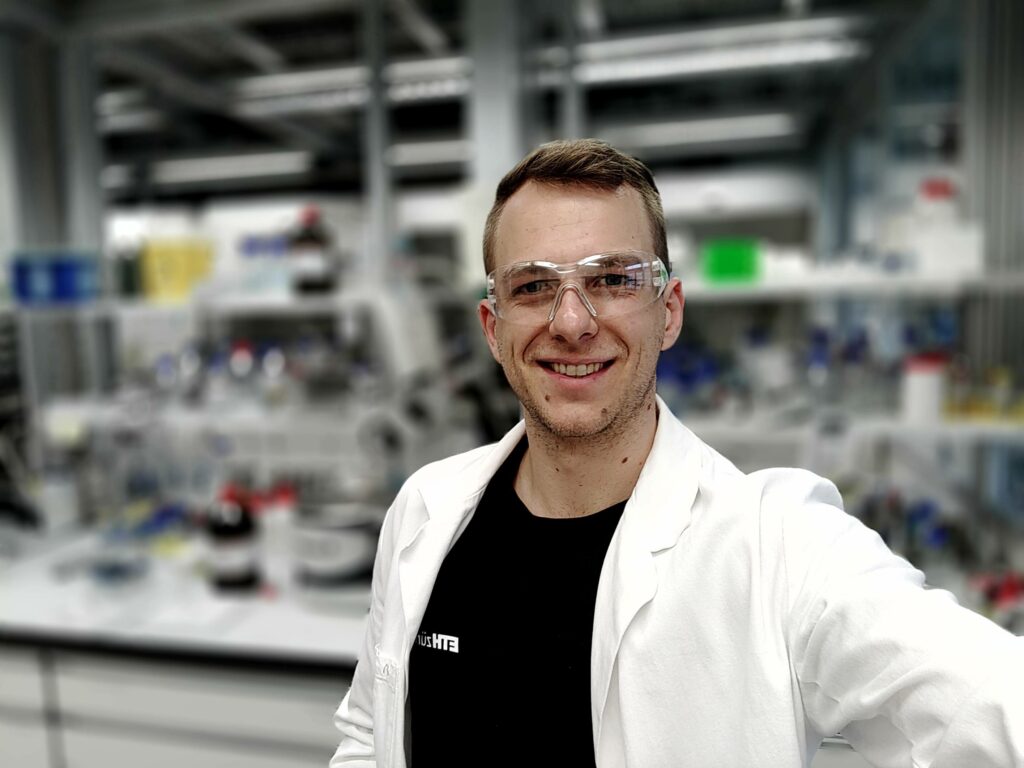We are delighted to congratulate Jasper Möhler from the Wennemers Group at ETH Zurich on defending his doctorate with great success at the end of June 2022. He is the first doctoral candidate part of the CLASSY project to defend his PhD. Jasper joined the CLASSY consortium from the start, during its kick-off in November 2019, and since then has brought key contributions to the project, with his work on tailored peptide catalysts developed for cascade reactions. In this news piece he shares some insights into his work and his experience as a doctoral researcher working within the CLASSY research and innovation action.
“I defended my PhD thesis in June 2022 under the mentorship of Prof. Helma Wennemers. Over the past years, I have been developing peptide catalysts for stereoselective organocatalyzed transformations. In particular, we focused on catalysts with the general motif H-Pro-Pro-Xaa, where Xaa can be any amino acid, to increase reactivity, stereoselectivity, and chemoselectivity. For those who do not think about catalysts most of the time, a catalyst is a substance that increases the rate of a reaction without being consumed. Catalysts make chemical reaction run more efficiently and are therefore key to more sustainable technologies.
My PhD was a great opportunity to develop myself further, to be involved in international collaborations, and to initiate exciting research projects.

A personal highlight during this time was participating in the CLASSY project, in which we are trying to advance conventional synthesis by, for example, combining multiple catalysts in a single chemical reactor and/or using compartmentalization to perform multiple reactions simultaneously. In CLASSY, experts from the fields of (bio)catalysis, in-flow, and supramolecular chemistry teamed up to develop methods that will ultimately reduce the amount of waste in chemical syntheses.
Working with the groups in CLASSY has broadened my knowledge and given me interesting insights into different research fields. I have enjoyed working with motivated and talented researchers at all levels, from experienced PI, post-docs, other fellow doctoral researchers like myself, to master students. I liked that everyone was encouraged to think freely, be creative, and solve different challenges. I have thoroughly enjoyed our regular meetings (virtual and twice in person) where we have advanced the many projects in stimulating discussions and started fruitful collaborations. For example, in the collaboration between our and the Kroutil group, I had the opportunity to learn a lot about enzyme catalysis, and I am especially grateful to Dr. Mathias Pickl-Farnberger and Prof. Wolfgang Kroutil for the great discussions we had and the nice lab visit I was able to make to Graz. Looking back , I am proud of what we have accomplished with joined forces since launching the CLASSY project at the end of 2019, and I’m excited about what more is to come.
Finally, I would like to say thank you: I am very grateful to Prof. Wennemers – Helma – for helping me grow as a scientist and person over the past years. Thank you to everyone involved in CLASSY for the great community, the enjoyable meetings (especially the face-to-face ones), and the valuable feedback I have received over the years. I have benefited from the collaborative and encouraging environment.
I look forward to seeing you again and would like to conclude by saying: stay CLASSY!
Jasper”
Read about the outcomes of Jasper’s work in the following publications:
- J. S. Möhler, L. K. Beiersdörfer, B. Masina, P. Wechsler, H. Wennemers. Tripeptide Organocatalysts for Stereoselective Conjugate Addition Reactions with N-Heterocyclic Substituents, Advanced Synthesis & Catalysis, 2022, in press, https://doi.org/10.1002/adsc.202200576. (highlighted as VIP – Very Important Publication)
- J. S. Möhler,* T. Schnitzer,* H. Wennemers. Amine Catalysis with Substrates Bearing N‐Heterocyclic Moieties Enabled by Control over the Enamine Pyramidalization Direction, Chemistry – A European Journal, 2020, 26, 15623, https://doi.org/10.1002/chem.202002966.
- Schnitzer,* J. S. Möhler,* H. Wennemers. Effect of the Enamine Pyramidalization Direction on the Reactivity of Secondary Amine Organocatalysts, Chemical Science, 2020, 11, 1943,https://doi.org/10.1039/C9SC05410C. (Not part of the CLASSY project)

